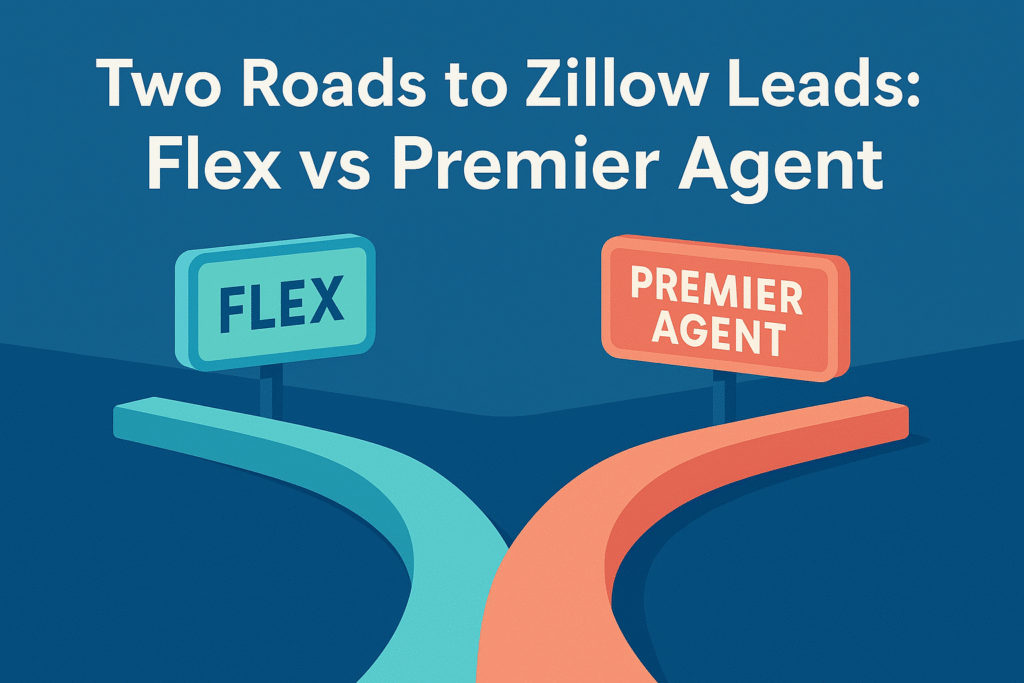There is a vast world of lead generation platforms for savvy agents. If you’ve been curious about Zillow products in particular, you’re not alone. Right now, Zillow is the largest online real estate retailer out there, with a full toolbox of options designed to help real estate teams gain more leads and generate more income.
The company has rolled out a couple of exciting lead generation platforms – Flex and Premier Agent – designed to help agents like you snag (and close) new deals. But why are there two different programs in the first place? We’re breaking it all down in this post.
What is Zillow Flex?
The Flex Program dishes out leads based on a referral model. Essentially, you get leads when they’re ready to take action, and you pay a referral fee only when you close a deal. The program is invitation-only, and there are standards that agents need to meet to be invited (and to stay in the platform). Referral fees are a percentage of the sale and are paid when the deal successfully closes, and the amount varies based on the deal price. Flex also uses advanced AI tools to vet leads and ensure they are warmer when passed along.
What is Premier Agent?
Here, you’re looking at a more traditional approach to lead generation. Premier Agent is all about ad-based lead generation, where you pay upfront to secure some time in the spotlight. Agents will commit to a fixed monthly fee that guarantees increased exposure on Zillow’s broad platform. There are upfront costs involved, but you get more visibility and access to quality leads. That does mean that you’ll be competing with other (successful) agents, as leads aren’t exclusive.

Zillow’s Strategy: Why Two Programs?
Zillow is a real estate powerhouse that has successfully embedded itself across multiple facets of the industry, serving buyers, sellers, agents, and brokerages alike. While we can’t confirm the strategy straight from their executive team, it’s clear that offering both Zillow Flex and Premier Agent is a deliberate way to address the diverse needs, budgets, and risk profiles of real estate professionals—while also maximizing Zillow’s reach and revenue through varied lead generation models.
By running two distinct programs, Zillow can engage agents at different stages in their careers. Flex, the invitation-only, performance-based option, appeals to those seeking highly vetted leads without upfront cost, paying only a referral fee when a deal closes. This reduces financial risk but comes with strict performance standards, making it ideal for confident converters who want a steady supply of warm leads. Premier Agent, on the other hand, attracts those who prefer predictable monthly spending, more control over lead targeting, and a strong personal branding presence through paid advertising.
This dual-pronged approach ensures Zillow can serve both seasoned teams ready to invest heavily in targeted ad placements and newer or more risk-averse agents focused on paying for results. In doing so, Zillow strengthens long-term agent relationships, deepens market penetration, and maintains a dominant industry presence. While some may raise concerns over the consolidation of real estate marketing power under a few brands, there’s no denying that the two complementary programs broaden Zillow’s appeal—and for now, there’s truly an option for almost every type of agent.

The Key Differences Between Flex and Premier Agent
Even though both platforms are Zillow products, there are some nuances that could make one product a better fit for your team. Namely:
- Cost Structure–Flex is all about referral fees after the fact, while Premier Agent requires cash upfront. Flex tends to be a better option for agents who need to beef up their pipeline quickly.
- Lead Quality–Flex leads are highly vetted, while Premier Agent’s leads can feel like a mixed bag. Some reviews say the leads they get are excellent, while others wish they were better. Lead quality varies based on location.
- Agent Selection–Flex offers a bit of exclusivity, while Premier Agent might have you sharing leads with other agents. With Premier Agent, there is no guarantee of the number of leads or how many agents will get them.
- Lead Routing– Competitive spirits are more likely to thrive in Premier Agent since they will be going head-to-head with other agents for leads.
- Agent Expectations–Flex has agent performance metrics while Premier Agent’s expectations are more about maintaining steady cash flow. It’s worth understanding the specific requirements for Flex before committing to a platform (you can read more about that here). For agents preparing to apply, our step-by-step guide on getting invited to zillow flex details the eligibility criteria and process.
Specific Pros and Cons of Zillow Flex
Advantages:
- Compensation is based on performance. Zillow Flex operates on a performance model, so agents only pay for leads that actually convert. For many, this leads to better allocation of marketing resources and helps agents to invest in higher-quality leads.
- Agents can access lead generation support. Agents receive leads directly from Zillow, which can save time and effort in sourcing prospects. This support allows agents to focus more on closing deals rather than spending extensive time on marketing. Plus, Zillow has additional resources to support the lead nurturing process, and you have access to a community which can be beneficial.
- Zillow has a massive audience. Being part of the Zillow network provides agents with access to a huge pool of potential buyers and sellers. This exposure can enhance visibility and increase the chances of converting leads into clients.
Potential Disadvantages:
- The referral fees can be hefty. Many agents say that they don’t like seeing the reduction in those hard-won commissions. Once you invest the time to close leads, it can be frustrating to see anywhere from 20-35% go to Zillow. For a deeper breakdown of how these referral fees are calculated and what agents should expect, our guide on Zillow Flex Pricing offers a full explanation.
- Agents have limited control over leads. They don’t have much say over the types of leads they receive or how they are distributed. This can lead to frustration if the leads do not align with their target market or expertise.
- There can be higher competition. Since many agents are part of the Zillow Flex program, competition for leads can be intense. This saturation can make it a bit more challenging for individual agents to stand out and convert leads effectively.
It’s worth noting that the high standards that Flex requires could be considered both a pro and a con, depending how you look at it. Some agents feel additional stress over meeting the specific metrics, while other people say meeting these requirements makes them better agents overall. If meeting those metrics stokes your competitive side and makes follow-up best practices more of a habit, that’s a great thing. But if you already get overwhelmed analyzing numbers, this added layer may be something you don’t want to deal with. If you want some Alternatives to Zillow flex check out our full article where we breakdown all of the options.

Specific Pros and Cons of Premier Agent
Advantages:
- Strong personal brand recognition. Zillow Premier Agent allows agents to build a robust personal brand on the platform, enhancing their visibility to potential clients. This branding can help agents differentiate themselves in a crowded market and also offers a reference to send new contacts.
- There’s a bit more control over leads. Agents can target specific zip codes and demographics, allowing more specificity over the types of leads they attract. This targeted approach can lead to higher conversion rates as agents connect with their ideal prospects.
- Access a suite of marketing tools. The platform offers various tools and resources, such as customized listings and marketing templates, helping agents create effective outreach strategies. These resources can streamline marketing efforts and enhance overall professionalism for agents.
Potential Disadvantages:
- Monthly fees and other costs can add up. Zillow Premier Agent often comes with higher regular fees or add-on costs associated with lead generation. This financial commitment may not be feasible for all agents, especially those just starting out.
- Crowded markets may have a lot of lead-sharing. Similar to Zillow Flex, agents may face competition for leads, which can dilute the effectiveness of their marketing efforts. The presence of multiple agents in the same area naturally makes it harder to convert leads into clients.
- Expect ongoing maintenance efforts. To maintain visibility and effectiveness on the platform, agents must continually invest time and resources into updating their profiles and marketing tactics. This commitment can sometimes feel burdensome for busy agents.
So, Which Program is Best for You?
Neither platform should be viewed as a magical ticket to success, but both have merit as part of an overall lead generation strategy. Generally speaking, if you’re a high-performing agent or part of a team ready to handle a larger volume of leads, Flex might be your best bet. To fully understand how the Zillow Flex Program works, including its invitation-only requirements and performance standards, check out our in-depth guide before deciding if it’s right for your business. On the flip side, if you prefer upfront investments and want more control over your budget, Premier Agent might be more your speed. Take a close look at the following:
- Your business model and team size
- Regular flow of leads and conversion process/timeline
- Market conditions and competitiveness
- Financial planning in both the short and long term
- Other marketing tactics or the need for personal branding
- Overall pipeline and close rates for the next few quarters
From there, you can see if your team is in a better position to invest in leads upfront or pay a percentage after the fact. Essentially, the choice comes down to one question: How confident are you that you can close the leads you receive?


